NALMS 2023 Election Candidates

The 2023 election for officers and directors is underway. Voting in the annual election is an important way for NALMS members to provide input in the management of the Society. Our officers and directors are all volunteers who serve without pay.
All members may vote for President-Elect and Secretary.
- The President-Elect serves for one year in that position after which they serve as President for one year and Past-President for one year.
- The Secretary serves for three years and may succeed themselves for one additional term.
Members may also vote for a director to represent their NALMS Region. Regional Directors are elected for a three-year term and may serve up to two consecutive terms.
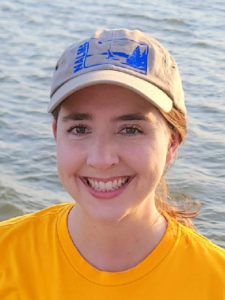 Victoria Chraïbi is a tenured associate professor of aquatic ecology at Tarleton State University. She holds a B.A. from Hanover College, Indiana, a Fulbright scholarship to McGill University, Quebec, an M.S. in water resources science from the University of Minnesota Duluth, and a Ph.D. in earth and atmospheric sciences from the University of Nebraska-Lincoln. As a paleolimnologist, past research includes Lake Memphrémagog, Lake Superior, and Yellowstone National Park. As a phycologist, current research focuses on Texas streams and reservoirs. Victoria is the assistant director of Timberlake Field Station, for which she coordinates educational outreach programming and manages student research initiatives.
Victoria Chraïbi is a tenured associate professor of aquatic ecology at Tarleton State University. She holds a B.A. from Hanover College, Indiana, a Fulbright scholarship to McGill University, Quebec, an M.S. in water resources science from the University of Minnesota Duluth, and a Ph.D. in earth and atmospheric sciences from the University of Nebraska-Lincoln. As a paleolimnologist, past research includes Lake Memphrémagog, Lake Superior, and Yellowstone National Park. As a phycologist, current research focuses on Texas streams and reservoirs. Victoria is the assistant director of Timberlake Field Station, for which she coordinates educational outreach programming and manages student research initiatives.
“I joined NALMS as a student member in 2011. The positive experience I had with the community in publishing my first-ever research article in LRM encouraged me to continue research in this field, and NALMS has supported me throughout my career. After arriving in Texas, I was elected as the Region 6 Director and have served two consecutive terms in that role. As a member of the board since 2018, I have rotated among several committees, head the Reservoir Working Group, and act as Parliamentarian at most meetings. As such, I have a good sense of the goals and values of NALMS and where we hope to progress in the near future. I am interested in serving in a role through which I can support the initiatives of the society that focus on supporting lake managers, students, and early career professionals, and fostering a diverse and inclusive community that advances lake management in North America.
To that end, I will support the Justice, Equity, Diversity, and Inclusion initiatives that have taken shape under the dedicated work of our JEDI committee, board, and society. As a professor at an institution that predominantly serves first generation college students and is an emerging Hispanic-serving institution, I have the good fortune to work every day with bright and promising students of diverse backgrounds. To me, diversity is inclusive of race, ethnicity, sex and gender, religion, disability, socioeconomic demographic, and far more. Any person interested in pursuing a career in lake management or lake science should receive the equitable support to do so. Such support takes many forms, such as accessibility, funding, and mentorship. NALMS provides many forums for members to have a voice as well as professional development opportunities, and these can be cultivated to increase the positive presence of NALMS in both the profession and the broader communities that we serve. This extends to the necessary and difficult discussions that are ongoing in our discipline regarding environmental justice and how such social considerations should guide decisions we make in managing lakes for both public need and environmental sustainability.
In the context of our ever-improving understanding of the complex, multifaceted, and interlinked nature of lake ecosystems and the communities they nourish, NALMS is in a perfect position to invite multiple voices to the forum, combining the wisdom of established members and aspirations of young members to the benefit of all. In my work on the NALMS board, I will continue to investigate ways the society can support members in regions dominated by reservoirs. I will support the growth of student and early career programming, particularly in ways that increase equity, diversity, and accessibility. I would also like to foster membership in Mexico so we can provide opportunities to incorporate all of North America in an inclusive, integrated network that expounds the values and advances the goals of NALMS.”
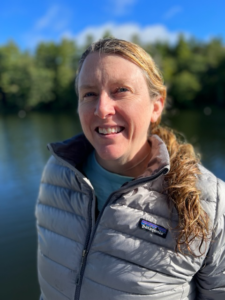 Dr. Danielle Wain is the Lake Science Director at the 7 Lakes Alliance, a regional NGO in the Belgrade Lakes watershed in central Maine, where she leads the water quality monitoring research program across the lakes. She has a BS in Civil Engineering (with an Environmental Engineering focus) from Cornell University and completed her PhD in Civil Engineering (with an emphasis in Environmental and Water Resources Engineering) at Iowa State University. Before moving to Maine, she was a Lecturer (Assistant Professor) in Water Quality Engineering at the University of Bath (UK). Her expertise is in process-based understanding of how lake and reservoir hydrodynamics impact ecology and biogeochemistry and how we leverage this knowledge to develop management strategies. She has been serving as Secretary of NALMS since January 2021.
Dr. Danielle Wain is the Lake Science Director at the 7 Lakes Alliance, a regional NGO in the Belgrade Lakes watershed in central Maine, where she leads the water quality monitoring research program across the lakes. She has a BS in Civil Engineering (with an Environmental Engineering focus) from Cornell University and completed her PhD in Civil Engineering (with an emphasis in Environmental and Water Resources Engineering) at Iowa State University. Before moving to Maine, she was a Lecturer (Assistant Professor) in Water Quality Engineering at the University of Bath (UK). Her expertise is in process-based understanding of how lake and reservoir hydrodynamics impact ecology and biogeochemistry and how we leverage this knowledge to develop management strategies. She has been serving as Secretary of NALMS since January 2021.
“During my first term as Secretary of NALMS, it has been very gratifying, both professionally and personally, to work alongside a Board so dedicated to the protection of our lakes and reservoirs. I am eager to continue using the skills and knowledge developed in my first term in service to the organization. I have also been active in multiple facets of NALMS including coordinating the new internship program and participating in multiple programs, including Freshwater HABs, the 314 Working Group, and the Justice, Equity, Diversity, and Inclusiveness (JEDI) Program.
I am very proud of all the hard work the JEDI Program is doing to make NALMS a welcoming environment for lake professionals of all backgrounds. Our profession should reflect the diversity of the wide array of stakeholders that we interact with through management activities. This is key to both lake management success and the future of our profession. I look forward to continuing to work with the JEDI program on their activities through my next term.”
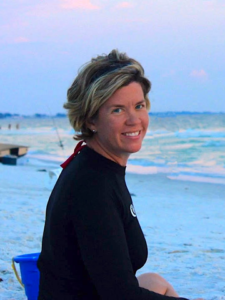 Amy Giannotti is the founder of AquaSTEM Consulting, LLC – an environmental consulting company specializing in lake and aquatic plant management, aquatic habitat restoration, and STEM outreach initiatives. Amy is a Certified Lake Manager and has over 25 years of experience working in temperate and subtropical marine and freshwater systems, including coastal and freshwater vegetation dynamics, exotic species management, impacts of nutrient enrichment and remediation efforts, stormwater management and watershed hydrology, submerged caves, and public speaking on environmental issues affecting lakes, springs, and karst community ecology. Amy holds a Bachelor of Science degree in biology from Marietta College (Ohio) and earned her Master of Science degree in environmental science from the University of Virginia, with a specialty in marine ecology. Since 2022, she has been serving as the NALMS Region 4 Director and is a member of the Professional Certification Program Committee.
Amy Giannotti is the founder of AquaSTEM Consulting, LLC – an environmental consulting company specializing in lake and aquatic plant management, aquatic habitat restoration, and STEM outreach initiatives. Amy is a Certified Lake Manager and has over 25 years of experience working in temperate and subtropical marine and freshwater systems, including coastal and freshwater vegetation dynamics, exotic species management, impacts of nutrient enrichment and remediation efforts, stormwater management and watershed hydrology, submerged caves, and public speaking on environmental issues affecting lakes, springs, and karst community ecology. Amy holds a Bachelor of Science degree in biology from Marietta College (Ohio) and earned her Master of Science degree in environmental science from the University of Virginia, with a specialty in marine ecology. Since 2022, she has been serving as the NALMS Region 4 Director and is a member of the Professional Certification Program Committee.
“For the last 20+ years, much of my daily work has focused on the technical aspects of habitat management in central Florida waters – supervising the lake management and stormwater field operations for municipal governments and state agencies and working in research on invasive aquatic plants and subaquatic caves and springs. I am interested in continuing to serve NALMS in this role because this professional Society is valuable for communicating scientific information to the public and with each other. Justice, equity, diversity, and inclusion (JEDI) are vital principles promoting fairness and respect for all individuals – regardless of background, identity, or abilities. Embracing JEDI fosters an inclusive Society, ensures equal access to opportunities, and acknowledges and rectifies historical and systemic injustices. Incorporating these values helps to dismantle barriers, creating a more welcoming and equitable Society and profession for all of us. For me, NALMS’s JEDI program is one of the most important foundations of the Society as it demonstrates a commitment to helping all succeed and feel safe.”
 Tony Thorpe has been the coordinator/program manager of the Lakes of Missouri Volunteer Program (LMVP) since 2001. The LMVP is a community science endeavor housed in the Aquatic Ecology laboratory at the University of Missouri that has collected over 19,000 water samples across the state of Missouri. Tony has been on the Board of Directors for the Lake of the Ozarks Watershed Alliance since its creation in 2006 and was active in the development of Missouri’s lake nutrient criteria. Tony earned his MS at the University of Missouri by examining the relationship between heterotrophic bacteria and measures of lake trophic state.
Tony Thorpe has been the coordinator/program manager of the Lakes of Missouri Volunteer Program (LMVP) since 2001. The LMVP is a community science endeavor housed in the Aquatic Ecology laboratory at the University of Missouri that has collected over 19,000 water samples across the state of Missouri. Tony has been on the Board of Directors for the Lake of the Ozarks Watershed Alliance since its creation in 2006 and was active in the development of Missouri’s lake nutrient criteria. Tony earned his MS at the University of Missouri by examining the relationship between heterotrophic bacteria and measures of lake trophic state.
“Like many NALMS members, I have devoted my academic and professional life to examining and protecting lakes. The goals of NALMS fit well with my own hands-on approach to research and extension. In addition to my 22 years as a volunteer coordinator and project manager, I will bring my experience as a 13-year board member of the Lake of the Ozarks Watershed Alliance to the NALMS Board of Directors. Both roles have helped me understand the relationship Missouri residents have with lakes. I hope to apply this understanding to increase regional NALMS membership and to disseminate the work of NALMS members to all communities. We need many perspectives to identify our lakes’ problems and seek solutions. It is essential that there is room at the table, especially for those who have historically been excluded (justice). If we exclude anyone simply because they fall into a culturally defined category, we narrow an otherwise wider path to potential success (diversity). For many understandable reasons, some communities may need encouragement to approach the table and others may need help reaching the table (equity). Once at the table, we need to make sure everyone feels welcome and is heard (inclusion).”
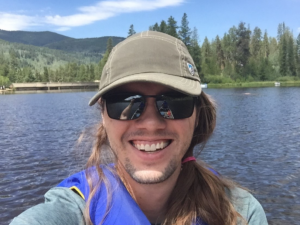 Caleb Owen is the Water Quality Administrator for the City of Thornton, Colorado where he leads the source water monitoring, management, and protection of more than 40,000 acft of water across 16 lakes and three watersheds. He also leads Thornton’s regulatory affairs and compliance program. He has worked for Thornton since 2015, initially performing water sampling and lab analysis. Caleb has served on the board of directors for the Colorado Lake and Reservoir Management Association since 2020, currently serving as President. He holds a B.S. in Chemistry and an Area of Special Interest in Environmental Science and Engineering from Colorado School of Mines.
Caleb Owen is the Water Quality Administrator for the City of Thornton, Colorado where he leads the source water monitoring, management, and protection of more than 40,000 acft of water across 16 lakes and three watersheds. He also leads Thornton’s regulatory affairs and compliance program. He has worked for Thornton since 2015, initially performing water sampling and lab analysis. Caleb has served on the board of directors for the Colorado Lake and Reservoir Management Association since 2020, currently serving as President. He holds a B.S. in Chemistry and an Area of Special Interest in Environmental Science and Engineering from Colorado School of Mines.
“One of the aspects of my job that I love the most and hope to bring to the board is protecting and improving water quality and increasing access to beneficial use opportunities in those water bodies for underrepresented populations. Water is such a limited and important resource in Region 8. Many majority-minority areas have one or fewer water resources for those underserved groups to enjoy and unfortunately those resources are most likely to be under threat of industrial/agricultural/municipal pollution. I have extensive experience in connecting with these communities, understanding their challenges, and advocating on a local, state, and national basis to improve their water experiences. I am interested in serving on the NALMS board to bring that advocacy experience to a national level and promote NALMS’ JEDI mission. Some of the goals I would have for my time on the board include recruiting a more diverse membership from Region 8 with a focus on increasing representation from Indigenous populations; promoting educational opportunities for members to learn how to create equitable beneficial use opportunities in their regions; partnering with advocacy groups to connect with diverse communities; and, gaining an understanding of different cultural perspectives throughout the region.”
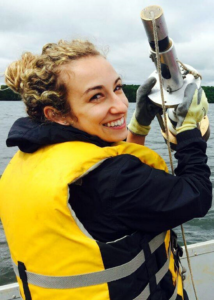 Liz Favot is a surface water scientist with the Ministry of the Environment, Conservation and Parks in Sudbury, Ontario, where she analyzes water quality data from industrial operations to support compliance with environmental laws. In prior roles, Liz worked for the Ministry of Natural Resources and Forestry as a fisheries policy biologist, and a research biologist, out of the Cooperative Freshwater Ecology Unit at the Vale Living with Lakes Centre, and as the Assistant Lake Stewardship Coordinator helping the Federation of Ontario Cottagers’ Associations (FOCA) to organize Canada’s largest community science lake water quality monitoring program (the Ontario Lake Partner Program). Liz completed her PhD and post-doctoral studies at Queen’s University in Kingston, Ontario. Her research focuses on applying paleolimnology to establish the environmental history of lakes affected by cyanobacterial blooms, which aids in establishing baseline conditions and developing historically informed management targets.
Liz Favot is a surface water scientist with the Ministry of the Environment, Conservation and Parks in Sudbury, Ontario, where she analyzes water quality data from industrial operations to support compliance with environmental laws. In prior roles, Liz worked for the Ministry of Natural Resources and Forestry as a fisheries policy biologist, and a research biologist, out of the Cooperative Freshwater Ecology Unit at the Vale Living with Lakes Centre, and as the Assistant Lake Stewardship Coordinator helping the Federation of Ontario Cottagers’ Associations (FOCA) to organize Canada’s largest community science lake water quality monitoring program (the Ontario Lake Partner Program). Liz completed her PhD and post-doctoral studies at Queen’s University in Kingston, Ontario. Her research focuses on applying paleolimnology to establish the environmental history of lakes affected by cyanobacterial blooms, which aids in establishing baseline conditions and developing historically informed management targets.
“Since first attending the symposium in 2016, I am continually inspired by the uniquely innovative and cooperative atmosphere of NALMS. In 2019–2020 I served as Student Director for the society and was subsequently delighted to be elected to represent Region 11 in 2020–2023. Region 11 is home to three-quarters of a million lakes, and many world-renowned freshwater scientists. I would like to ensure that more of these are represented within NALMS to help assess, monitor, and mitigate pertinent water issues. Throughout my term as Region 11 director, I’ve initiated discussions to support early career professional engagement with NALMS, and if re-elected I aim to ensure actions are implemented to address this issue. A pillar of NALMS is interdisciplinary engagement, fundamental to which is fostering inclusive, equitable, and collaborative aquatic science communities. I support such a community at NALMS through my involvement with the Justice, Equity, Diversity, and Inclusion (JEDI) Committee since its inception, and through organizing the first JEDI-focused keynote at the 2020 symposium. I am eager to continue this work in the coming years.”
